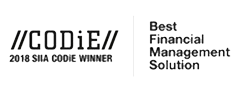Accelerate IFRS 17 compliance with a solution that's equally as quick to implement as it is to use. Building from our Solvency II experience, CCH Tagetik IFRS 17 is a pre-configured starter kit that provides you with all the functionality to comply with IFRS 17’s requirements – including general, premium allocation, and variable fee model – while seamlessly integrating with your existing actuarial, finance, and risk systems.
CCH Tagetik IFRS 17 simplifies compliance with a powerful data engine and reporting hub. You get a data repository, calculation modelling, reporting and disclosures in one easy-to-use solution. Since we built our solution for finance, you can easily adapt to the evolving standard as it changes, without coding. Get the transparency you need and make complex compliance easy with CCH Tagetik.
CCH Tagetik IFRS 17: Insurance Contracts software is recognized by leading Analysts:
3 reasons why CCH Tagetik IFRS 17 let's you focus on your business
Get Compliant Quickly
Quickly and accurately comply to IFRS 17’s three approaches. Automate data collection, calculations, reports and disclosures and control the process by using our workflow and audit trail.
Fast, Accurate Calculations
Quickly calculate present value of future cash flows, contractual service margin (CSM), liability for remaining coverage (LRC) and incurred claims (LIC), perform onerous contract test and analyze movements.
Insurance Contract Data Repository
Our solution plugs into your existing systems architecture – without disruption. CCH Tagetik seamlessly connects to actuarial, finance and risk systems and centralizes all contract data in a single trusted source.
See CCH® Tagetik IFRS 17 in action
CCH Tagetik's Insurance Contracts: IFRS 17 is trusted by leading companies across all industries.
-
Pure Insurance
-
Samsung Life Insurance
-
Triglav
-
RSA Insurance
For Pure Insurance, collaboration was key to implementation of CCH® Tagetik for IFRS 17
Samsung Life Insurance's path to IFRS 17 excellence with CCH® Tagetik
Efficiency and accuracy: Triglav's IFRS 17 journey powered by CCH® Tagetik
Mastering IFRS 17: How RSA achieved compliance using CCH® Tagetik
Insurance Contracts: IFRS 17
General accounting model, premium allocation, variable fee – prepare, normalize, and centralize contract data using the best approach for your organization. CCH Tagetik simplifies compliance with a solution that will evolve with standard.
- Simplify compliance with an end-to-end solution
- Single data repository for drill-down and analysis
- Comprehensive reports and interactive dashboards
- Automatic compliant journals and disclosures
- Boost efficiency with workflow and audit trail
Key benefits you will gain with CCH Tagetik IFRS 17 solution
A simple, non-disruptive approach to IFRS 17 compliance implemented by insurance experts. CCH Tagetik centralizes contractual data by seamlessly integrating to any source including general ledgers and actuarial systems.
- Comply quickly with pre-packaged solution
- Flexible solution adaptable to standards
- Reduce IT needs with a finance-owned solution
- End-to-end integrated process mitigates risk
- Align all stakeholders with trusted reports
CCH® Tagetik recognized as a Leader in Chartis Research IFRS 17 and LDTI Market Update and Vendor Landscape report
Complex compliance VS. expandable pre-built solution: how Tokio Marine met IFRS 17 requirements with CCH® Tagetik
Erste Group implemented CCH Tagetik’s software solution for Group Consolidation, Reporting, IFRS & FinRep Compliance, Segment Reports, Risk Information, Basel III
Discover why Erste Group trusts CCH Tagetik.
-
What is IFRS 17?
IFRS 17 was created to replace IFRS 4 Insurance Contracts, which lacked the rules for comparing contracts between companies.
Through a single accounting model for all insurance contracts, IFRS 17 aspires to create consistency, transparency and improved confidence in insurance contract reporting. The standard aims to expose the obligations, risk, and profitability of insurance contracts.IFRS 17 seeks to provide more comparability between:
- companies across borders
- insurance contracts
- industries
IFRS 17 will benefit stakeholders by creating a more apples-to-apples comparison of global contracts. Since filers must disclose more useful and actionable information, the new standard will inevitably contribute to higher long-term financial stability.
From January 1, 2022, IFRS 17 Insurance Contracts is into effect for all insurers who are subject to IFRS standards.
-
What is necessary to be compliant with IFRS 17?
To comply with IFRS 17, affected organizations will have to:
- Redefine corporate data management structures. Organizations will need a firm grip on their corporate data management. They should have access to and control of data governance, lineage and transparency across the entire reporting chain. To comply easily, organizations will need access to report on a wide range of historical, real-time, and predictive data.
- Overhaul reporting and operating models. The approach to reporting that IFRS 17 requires (The Building Blocks approach and the Premium Allocation Approach) will necessitate changes to your financial management processes and your operating model.
- Navigate the gaps between IFRS 4 and IFRS 17. IFRS 17 requires more in-depth and more detailed data and reporting than IFRS 4. Complying organizations will need to do a gap analysis to ensure their processes, systems, and data requirements are tuned to the new regulations.
- Manage operational risk and costs. There is a cost to changing your existing processes and adopting new methods. To comply with IFRS 17, organizations will incur a human resources cost, time cost, and financial cost.
- Rewire existing reporting processes. IFRS 17 will impact the architecture of reporting processes including operational systems, actuarial models, general ledgers, consolidation and performance management systems. Each organization will need to audit their financial processes and software to ensure the tools they’re using meet their new needs.
- Perform new measurements. IFRS 17 requires new measurements for internal revenue, profit metrics, and external reports.
- Conduct advanced planning and forecasting. Organizations will need to implement advanced forecasting technology that can perform simulations to provide reliable financial forecasts using granular information.
- Determine the impact on assets and liabilities. IFRS 17 will require organizations to up the ante on their asset and liability management programs.
Implement new systems. To handle IFRS 17’s impacts, organizations will have to implement new systems that are fit to manage their needs today and in the future.
-
Who is impacted by IFRS 17?
If your company issues insurance contracts and you’re subject to IFRS regulations, then IFRS 17 applies to you. For the most part, IFRS 17 affects companies in the insurance industry. If you had to comply with IFRS 4, then you will have to comply with IFRS 17. -
How to implement IFRS 17?
All impacted filers will have to:
- Understand the ins and outs of the IFRS 17 requirements.
- Perform a gap analysis on IFRS 4 vs. IFRS 17 process needs including corporate data governance, architecture, corporate performance management system, reporting processes.
- Ensure data governance, lineage, and transparency across the entire reporting chain.
- Have access to a wide variety of historical, real-time, and predictive data including policy and premium data, data used to produce the risk adjustments, data used to generate cash flow projections.
- Revisit their current performance and financial management systems and data strategy. New software may be required.
- Implement end-end-end data and architecture flow, data processes and policies.
- Make changes to the general ledger using the building blocks approach.
- Change the way they disclose short-term contracts using the premium allocation approach.
- Make changes to systems and data requirements that allow organizations to collect more granular data.
- Make changes to profit recognition patterns.
- Increased disclosures for greater transparency.


